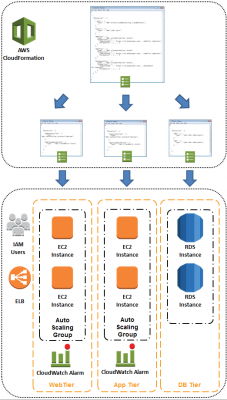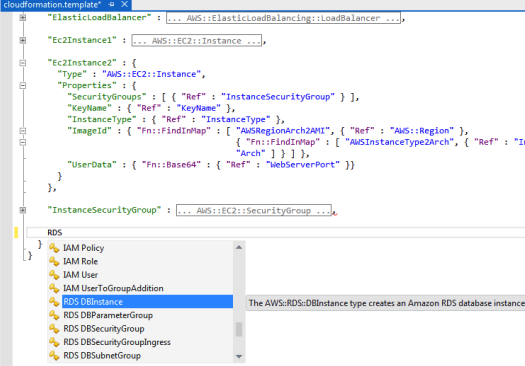CloudFormation Templates
- It is a JSON or YAML formatted text file.
- save them with any extension, such as
- .json
- .yaml
- .template
- .txt
- CloudFormation uses them for building AWS resources.
- Example template with EC2 instance needs
- instance type
- the AMI ID
- block device mappings
- and its Amazon EC2 key pair name.
- Whenever you create a stack, you also specify a template that AWS CloudFormation uses to create whatever you described in the template.
- For JSON, it follows the ECMA-404 JSON standard
- For XAML, supports the YAML Version 1.1 specification with exceptions, as
- The binary, omap, pairs, set, and timestamp tags
- Aliases
- Hash merges

JSON formatted template layout
{
“AWSTemplateFormatVersion” : “version date”,
“Description” : “JSON string”,
“Metadata” : {
template metadata
},
“Parameters” : {
set of parameters
},
“Mappings” : {
set of mappings
},
“Conditions” : {
set of conditions
},
“Transform” : {
set of transforms
},
“Resources” : {
set of resources
},
“Outputs” : {
set of outputs
} }
XAML formatted template layout
—
AWSTemplateFormatVersion: “version date”
Description:
String
Metadata:
template metadata
Parameters:
set of parameters
Mappings:
set of mappings
Conditions:
set of conditions
Transform:
set of transforms
Resources:
set of resources
Outputs: set of outputs
Template Sections
- Templates has many sections.
- The Resources section is the only required section.
- Some sections in a template can be in any order.
- Various templates sections are
- Resources (required) – stack resources and their properties
- Format Version (optional) – template format version that template conforms to.
- Description (optional) – text string describing the template. Must always follow template format version section.
- Metadata (optional) – Objects that provide additional information about the template.
- Parameters (optional) – Values to pass to template at runtime
- Mappings (optional) – A mapping of keys and associated values to specify conditional parameter values, similar to a lookup table.
- Conditions (optional) – Conditions controlling resource creation or resource property assignment during stack creation or update.
- Transform (optional) – For serverless applications, specifying version of AWS Serverless Application Model to use.
- Outputs (optional) – Describes values returned whenever viewing stack’s properties.

AWS Certified DevOps Engineer Free Practice TestTake a Quiz
